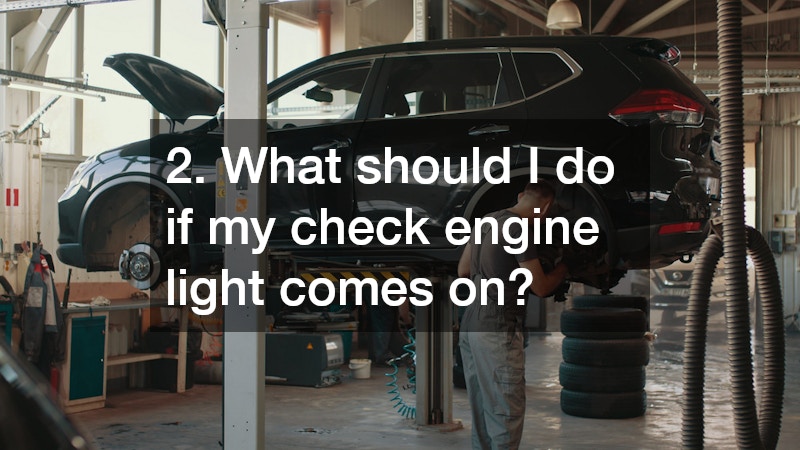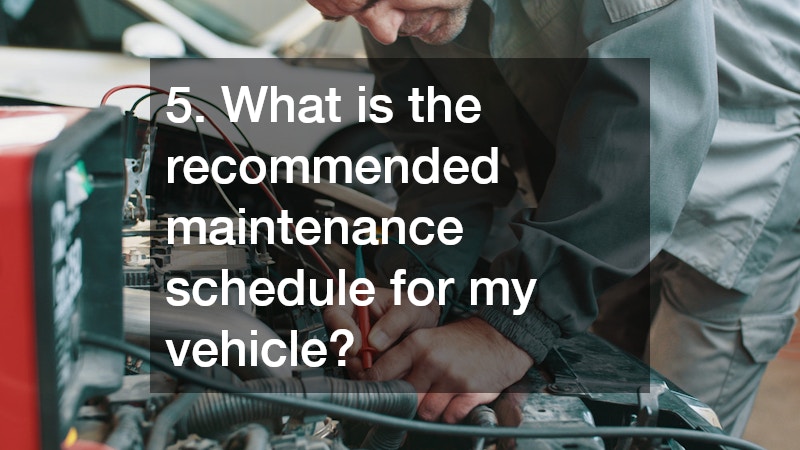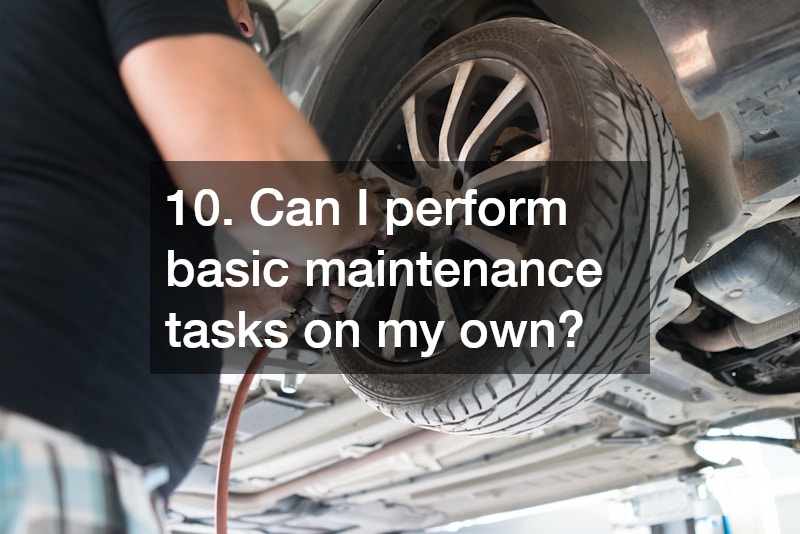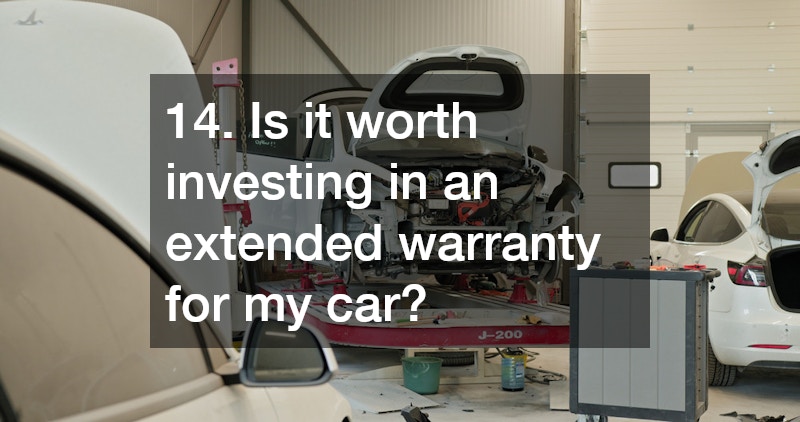Understanding the essentials of auto repair and maintenance can help you keep your vehicle running smoothly, extend its lifespan, and ensure your safety on the road. By addressing common auto repair FAQs, such as oil changes, brake maintenance, and battery replacements, you can stay proactive about caring for your car.
1. How often should I get my oil changed?
Regular oil changes are essential for maintaining the overall health of your vehicle. By consistently changing your oil, you can prevent engine wear, improve fuel efficiency, and extend the lifespan of your car. This is one of the most important auto repair FAQs to consider.
Most experts recommend getting your oil changed every 3,000 to 5,000 miles, but it’s always best to consult your owner’s manual for specific recommendations based on your vehicle’s make and model. Ignoring regular oil changes can result in engine damage, decreased performance, and costly repairs down the line. Make it a priority to stay on top of this crucial maintenance task.

2. What should I do if my check engine light comes on?
This is one of the most common auto repair FAQs! If your check engine light comes on, the first step is to pull over and check your car’s diagnostic trouble codes (DTC). These codes can help you identify the specific issue causing the light to turn on. Sometimes small, inconsequential issues can set off your car security systems, so it pays to take a closer look ASAP.
Once you have the DTC, you can either address the problem yourself if it’s a minor issue or take your car to an auto repair shop for professional diagnosis and repair. Ignoring a check engine light can lead to more serious engine problems and potentially leave you stranded on the side of the road. It’s always best to address this issue promptly.
3. How can I tell if my brakes need to be replaced?
There are several warning signs that indicate your brakes may need to be replaced, including screeching or grinding noises when you brake, a spongy brake pedal, or the vehicle pulling to one side when you brake.
If you notice any of these signs, it’s crucial to visit a brake shop or auto repair shop immediately to have your brakes inspected and replaced if necessary. Neglecting brake issues can put you and other drivers at risk on the road. Regular brake inspections and maintenance can help you avoid costly brake repair fees and ensure your vehicle’s safety and performance on the road. Let’s look at more auto repair FAQs.
4. Is it important to rotate my tires regularly?
Tire rotation is essential for promoting even tire wear, extending the life of your tires, and maintaining optimal vehicle performance. By rotating your tires regularly, you can prevent uneven wear patterns and ensure a smoother, safer ride.
Most experts recommend rotating your tires every 5,000 to 7,000 miles or as recommended by your vehicle’s manufacturer. Be sure to consult your owner’s manual for specific tire rotation guidelines. Neglecting tire rotation can result in premature tire wear, decreased traction, and poor handling, potentially putting you at risk for accidents on the road. Make it a habit to include tire rotation in your regular maintenance routine.

5. What is the recommended maintenance schedule for my vehicle?
Following a recommended maintenance schedule is crucial for keeping your vehicle running smoothly, preventing breakdowns, and extending its lifespan. Common maintenance tasks include oil changes, tire rotations, brake inspections, and fluid checks.
Consult your owner’s manual for a detailed maintenance schedule tailored to your vehicle’s make and model. By following these guidelines, you can stay on top of important maintenance tasks and avoid costly repairs in the future. Regular maintenance not only ensures your safety on the road but also helps maintain the value of your vehicle and improve its overall performance. Make it a priority to stick to your maintenance schedule.
6. How can I improve my car’s fuel efficiency?
There are several ways to improve your car’s fuel efficiency, such as maintaining proper tire pressure, avoiding aggressive driving, reducing excess weight in your vehicle, and keeping up with regular maintenance.
By following these fuel-saving tips, you can maximize your gas mileage, save money on fuel costs, and reduce your carbon footprint. Consistent maintenance, including oil changes and air filter replacements, can also help optimize your vehicle’s fuel efficiency. For additional fuel-saving advice tailored to your vehicle, consult with an auto mechanic or automotive repair shop to identify specific areas where you can improve your car’s fuel economy. Read on to learn more answers to auto repair FAQs.
7. What should I do if my car is making strange noises?
If your car is making unusual noises, such as grinding, squealing, or rattling sounds, it’s important to address the issue promptly to prevent further damage and costly repairs. These noises could be a sign of engine repair or other mechanical problems.
Consulting with an auto repair shop or mechanic can help you diagnose the source of the noise and determine the necessary repairs. Ignoring strange car noises can lead to more significant issues down the line and compromise your vehicle’s safety and performance.
Don’t hesitate to seek professional help if you notice any unusual sounds coming from your car. Your mechanic can identify the problem and recommend the best course of action for repair.
8. Is it safe to drive with a cracked windshield?
Driving with a cracked windshield can compromise your safety on the road and put you at risk for accidents. A cracked windshield can impair your visibility, weaken the structural integrity of your vehicle, and increase the likelihood of the glass shattering in a collision.
For your safety and the safety of others on the road, it’s crucial to address a cracked windshield promptly by visiting an auto collision center or windshield repair shop. They can assess the damage and determine if a repair or replacement is necessary.
Don’t take any chances when it comes to a cracked windshield. Prioritize your safety and have the issue resolved by a professional as soon as possible.
9. How do I know when it’s time to replace my battery?
There are several signs that indicate it may be time to replace your car battery, including slow engine cranking, a check engine light, dim headlights, or a swollen or leaking battery case. These symptoms can signal a failing battery that needs immediate attention.
If you notice any of these warning signs, visit an auto repair shop or battery store to have your battery tested and replaced if necessary. Ignoring a failing battery can leave you stranded and in need of a jump-start or tow.
Regular battery inspections and replacements can help you avoid unexpected breakdowns and ensure your vehicle starts reliably. Stay proactive about your battery health to keep your car running smoothly.

10. Can I perform basic maintenance tasks on my own?
While some maintenance tasks are best left to professionals, there are several basic auto repair tasks that you can perform on your own, such as changing your oil and air filter, checking and topping off fluids, and replacing wiper blades.
By learning how to do these simple tasks, you can save money on maintenance costs and gain a better understanding of your vehicle’s overall health. There are many online resources and tutorials available to guide you through these DIY maintenance tasks.
However, if you’re unsure about performing a particular maintenance task or don’t have the necessary tools or expertise, it’s always best to consult with an auto mechanic or car repair services for assistance.
11. What is the difference between regular and synthetic oil?
Synthetic oil offers several advantages over conventional oil, including better performance in extreme temperatures, improved engine protection, and longer oil change intervals. While synthetic oil may cost more upfront, it can provide long-term benefits for your vehicle.
Regular oil, on the other hand, is more affordable and suitable for vehicles with lower mileage and less demanding driving conditions. It’s essential to consult your owner’s manual to determine which type of oil is recommended for your vehicle.
Whether you choose regular or synthetic oil, maintaining regular oil changes is crucial for keeping your engine running smoothly and preventing costly engine repairs in the future.
12. How can I avoid common car problems in the winter?
Cold weather can take a toll on your vehicle, so it’s essential to prepare for winter driving by performing preventative maintenance tasks, such as checking your battery, antifreeze, and tire pressure. It’s also a good idea to keep an emergency kit in your car in case of unexpected breakdowns.
Regularly inspecting and maintaining your car’s heating system, defroster, and tires can help you avoid common winter car problems, such as frozen pipes, dead batteries, and slippery road conditions. Stay proactive about winter car maintenance to ensure your safety on the road.
If you encounter any issues with your car during the winter months, don’t hesitate to visit an auto mechanic or automotive repair shop for professional assistance. They can help address any cold-weather-related car problems and keep your vehicle running smoothly in the winter.
13. What is the purpose of the car’s transmission?
The transmission plays a crucial role in your vehicle’s operation by transferring power from the engine to the wheels and controlling the speed and torque of your car. A properly functioning transmission is essential for smooth acceleration, optimal fuel efficiency, and overall vehicle performance.
If you experience issues with your car’s transmission, such as slipping gears, delayed engagement, or strange noises, it’s important to have the problem diagnosed and repaired by a professional auto mechanic. Ignoring transmission issues can lead to more significant problems down the line.
Regular transmission maintenance, including fluid changes and inspections, can help prolong the lifespan of your transmission and prevent costly repairs. Stay vigilant about car transmission repairs to keep your vehicle running smoothly. Let’s answer more auto repair FAQs!

14. Is it worth investing in an extended warranty for my car?
An extended warranty can provide peace of mind by covering the cost of unexpected repairs and maintenance after your manufacturer’s warranty expires. While an extended warranty may offer financial protection against major repairs, it’s essential to carefully review the terms and coverage options before purchasing.
Consider factors such as your vehicle’s age, mileage, and reliability when deciding whether to invest in an extended warranty. If you plan to keep your car long-term or have concerns about costly repairs, an extended warranty may be a worthwhile investment.
Consult with an auto repair shop or car dealership to explore extended warranty options and determine if it aligns with your car ownership goals and budget. Be sure to weigh the pros and cons before making a decision. Let’s look at our next question on our list of auto repair FAQs.
15. How can I find a reliable auto repair shop?
When looking for a trustworthy auto repair shop, consider factors such as certifications, experience, customer reviews, and warranties offered. Choose a shop that specializes in your vehicle’s make and model and has a proven track record of quality service.
Ask for recommendations from friends, family, or online resources to find reputable auto repair shops in your area. Schedule a consultation or inspection with a few shops to assess their professionalism, knowledge, and customer service before making a final decision.
Building a relationship with a reliable auto mechanic can help you maintain your vehicle’s health, address repairs promptly, and establish a trusted source for automotive repair services. Take the time to research and choose an auto repair shop that meets your needs and expectations.
Furthering The Answers to These Auto Repair FAQs
Whether you choose to perform basic maintenance tasks on your own or rely on the expertise of auto repair professionals, consistent care and attention to your vehicle can help prevent costly repairs and breakdowns. Research the answers to your auto repair FAQs, prioritize regular maintenance, address issues promptly, and consult with trusted auto repair shops for expert advice and service.
Remember that taking care of your vehicle is an investment in its longevity and performance. Stay informed about recommended maintenance schedules, industry best practices, and auto repair services to ensure your car remains in top condition and serves you well for years to come. For answers to more auto repair FAQs, consult your local auto shop or auto experts.
